12 Best In-App User Behavior Analytics Tools (2026)
In-app user behavior analytics tools help product teams analyze how users interact with features, flows, and events inside their product. This guide compares the best in-app behavior analysis tools for 2025.
In today's competitive SaaS landscape, guessing what users want is a recipe for failure. To build products that win, you need to see exactly how users interact with your platform: where they get stuck, what features they love, and what drives them to convert or churn. This is where user behavior analytics tools become essential. They move you from assumptions to data-driven insights, allowing you to optimize every step of the customer journey with precision.
These platforms help you answer critical questions that traditional analytics can't, like "Why did our new signups drop off after the tutorial?" or "Which user segment gets the most value from our advanced features?" Understanding this "why" is the key to improving activation rates, reducing churn, and increasing lifetime value. To truly understand your users and improve retention, consider key mobile onboarding best practices that directly impact initial user engagement.
This guide cuts through the marketing noise to analyze the 12 best user behavior analytics tools available today. We'll dive deep into each platform, comparing core features, pricing models, and ideal use cases to help you find the perfect solution for your team. Each review includes screenshots and direct links, giving you everything needed to make a confident decision and start building better products.
1. Amplitude
Amplitude is a premier digital analytics platform that goes beyond simple page views, positioning itself as a comprehensive product intelligence solution. It excels at helping product, marketing, and growth teams understand the entire customer journey by connecting user actions to business outcomes. Unlike traditional analytics tools that often focus on surface-level metrics, Amplitude is one of the best user behavior analytics tools for deep, event-based analysis, allowing you to see exactly how users interact with your product features over time.

This platform is particularly powerful for creating behavioral cohorts to analyze retention, building detailed conversion funnels, and understanding user paths. Its interface is robust yet intuitive, making complex data queries accessible without needing to write SQL. For teams looking to not only analyze behavior but also act on it, Amplitude's integrated Experiment and new Feature Management products offer a complete A/B testing and feature flagging suite within the same ecosystem.
Key Features & Considerations
- Event-Based Analytics: Deeply analyzes user actions through funnels, retention charts, and behavioral cohorts.
- Integrated Product Suite: Offers Session Replay, A/B Testing (Experiment), and Feature Management tools for a unified workflow.
- Generous Free Tier: Provides a powerful free plan for startups and small teams, making it accessible to get started.
ProsConsStrong focus on product analytics and user journeys.Pricing based on Monthly Tracked Users (MTUs) can become complex to forecast.Generous free tier is excellent for new projects.Advanced features require upgrading to more expensive 'Plus' or 'Growth' tiers.Scales effectively from startups to large enterprises.Can have a steeper learning curve compared to simpler analytics platforms.
Website: https://www.amplitude.com
2. Mixpanel
Mixpanel is a powerful, event-based analytics platform designed for product teams that need rapid, real-time insights into user behavior. It excels at answering complex "why" questions behind user actions, moving beyond vanity metrics to focus on conversion, retention, and engagement. As one of the most established user behavior analytics tools, it is renowned for its speed in ad-hoc analysis, allowing teams to build funnels, segment users into behavioral cohorts, and analyze user flows on the fly.
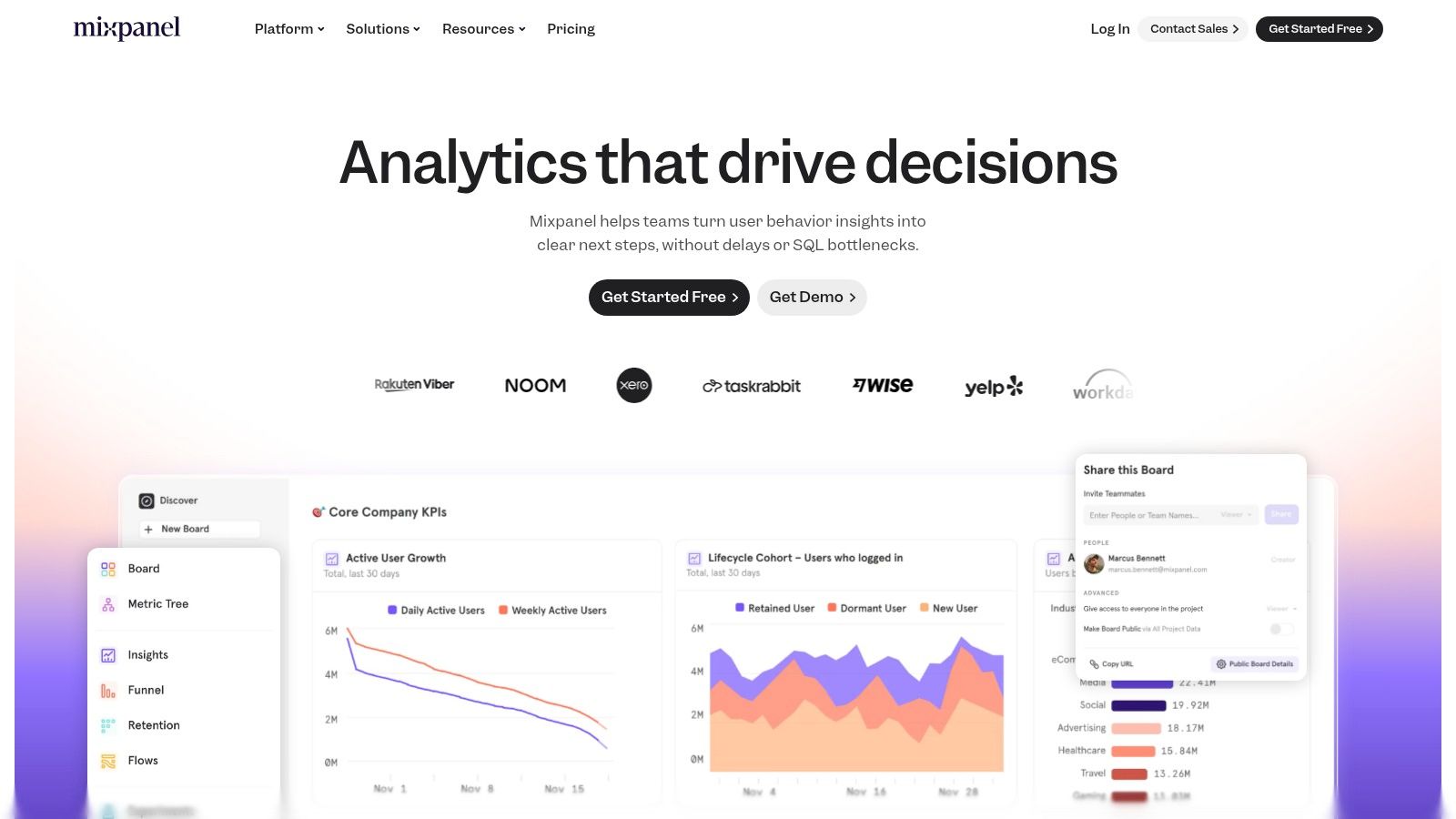
The platform is built to empower product-led growth (PLG) teams with features like guided AI answers and strong data governance to ensure insights are both accessible and trustworthy. A key differentiator is its practical, event-based pricing model, which is often more predictable for high-traffic products than user-based models. With its Data Pipelines add-on, Mixpanel also integrates smoothly into a modern data stack, syncing with warehouses like Snowflake or BigQuery for a unified view of customer data.
Key Features & Considerations
- Real-Time Event Analytics: Offers high-speed reporting for funnels, flows, retention, and behavioral cohorts.
- Usage-Based Pricing: Provides a clear, event-based pricing model with an optional MTU plan for enterprise needs.
- Guided Insights & Governance: Includes AI-powered tools to guide analysis and features to maintain data quality.
ProsConsFree plan and a 30-day 'reverse trial' for paid features.Advanced features like data pipelines and SSO are gated to higher plans.Clear event-based billing is easy to forecast.The MTU-based enterprise plan can have a high entry point and is sales-led.Mature reporting ideal for product-led growth (PLG) teams.Can be more complex to set up initially compared to all-in-one solutions.
Website: https://www.mixpanel.com
3. Heap (by Contentsquare)
Heap stands out in the crowded analytics space with its "autocapture" technology, a powerful approach that automatically collects all user interactions from the moment the tracking snippet is installed. This means you don't need to define events in advance, allowing you to retroactively analyze behaviors you hadn't anticipated. As one of the most flexible user behavior analytics tools, Heap empowers teams to ask new questions about past user data without waiting for engineering resources to implement new tracking.
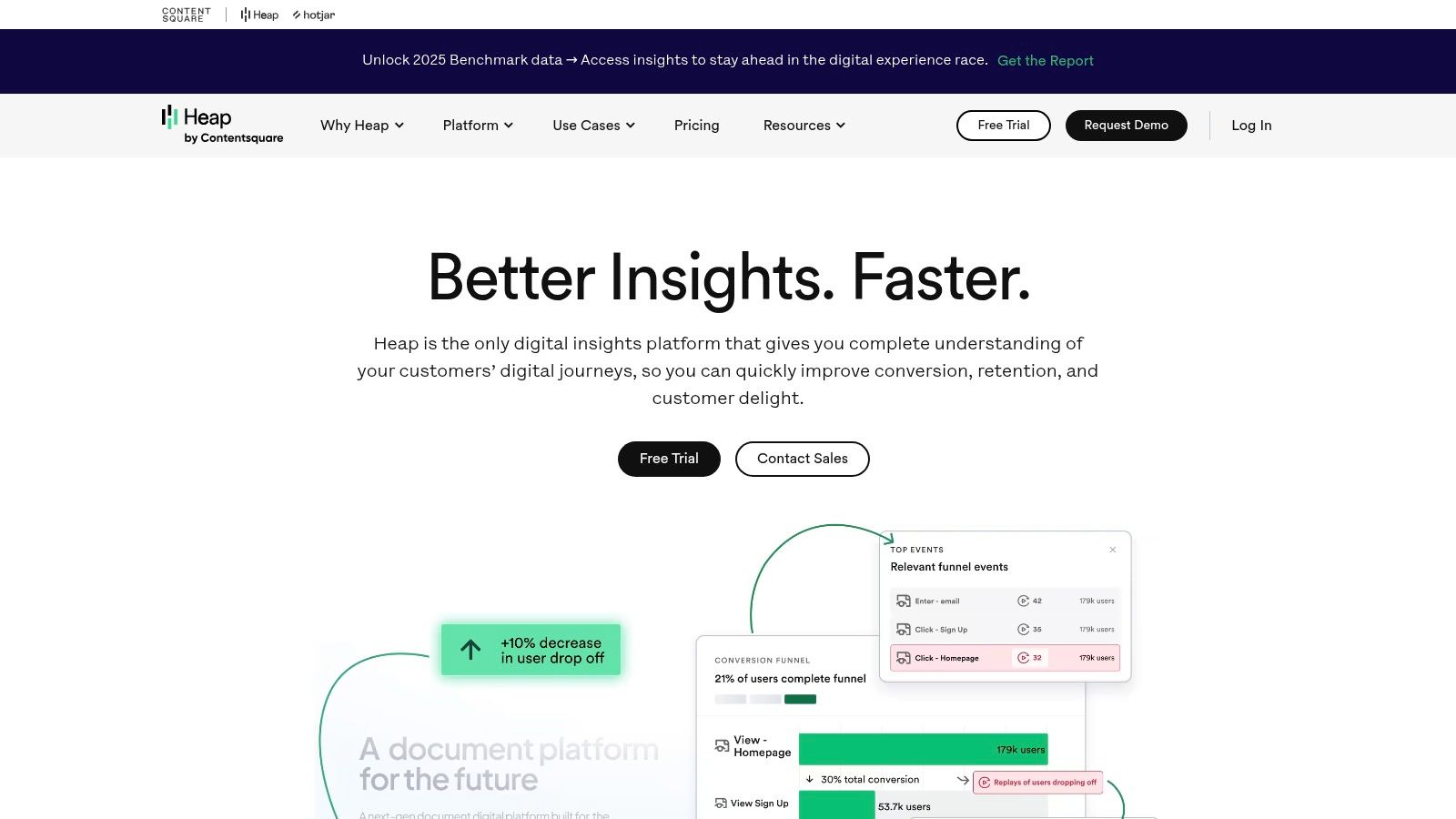
This platform is especially valuable for product and marketing teams that need to move quickly and iterate without being blocked by coding dependencies. With features like Journeys, funnels, and an engagement matrix, you can visualize complete user paths and identify friction points on the fly. Its B2B capabilities are also robust, offering account-level analytics to understand how entire organizations engage with your product. For those interested in a deeper look, you can learn more about its capabilities as one of several website visitor tracking tools.
Key Features & Considerations
- Automatic Data Capture: Captures every user event (clicks, swipes, form fills) without manual tagging for retroactive analysis.
- Account-Level Analytics: Provides strong B2B features for understanding usage patterns across entire customer accounts.
- Visual Event Definition: Allows non-technical users to define and label events directly from the product interface.
ProsConsAutocapture significantly shortens time-to-value.Pricing is opaque above the free and entry tiers; requires a sales call.A generous free tier is suitable for initial validation.The free plan has session and data history limits that may be restrictive.Strong B2B and account-level analytics options.Autocaptured data can sometimes feel overwhelming to organize initially.
Website: https://heap.io
4. FullStory
FullStory is a digital experience intelligence (DXI) platform renowned for its high-fidelity session replay capabilities, which it combines with powerful analytics. It stands out by automatically capturing every user interaction on a website or app without manual tagging, providing a complete, retroactive dataset. This makes it one of the most effective user behavior analytics tools for teams who need to understand the "why" behind user actions, diagnose bugs, and identify friction points with pixel-perfect clarity.
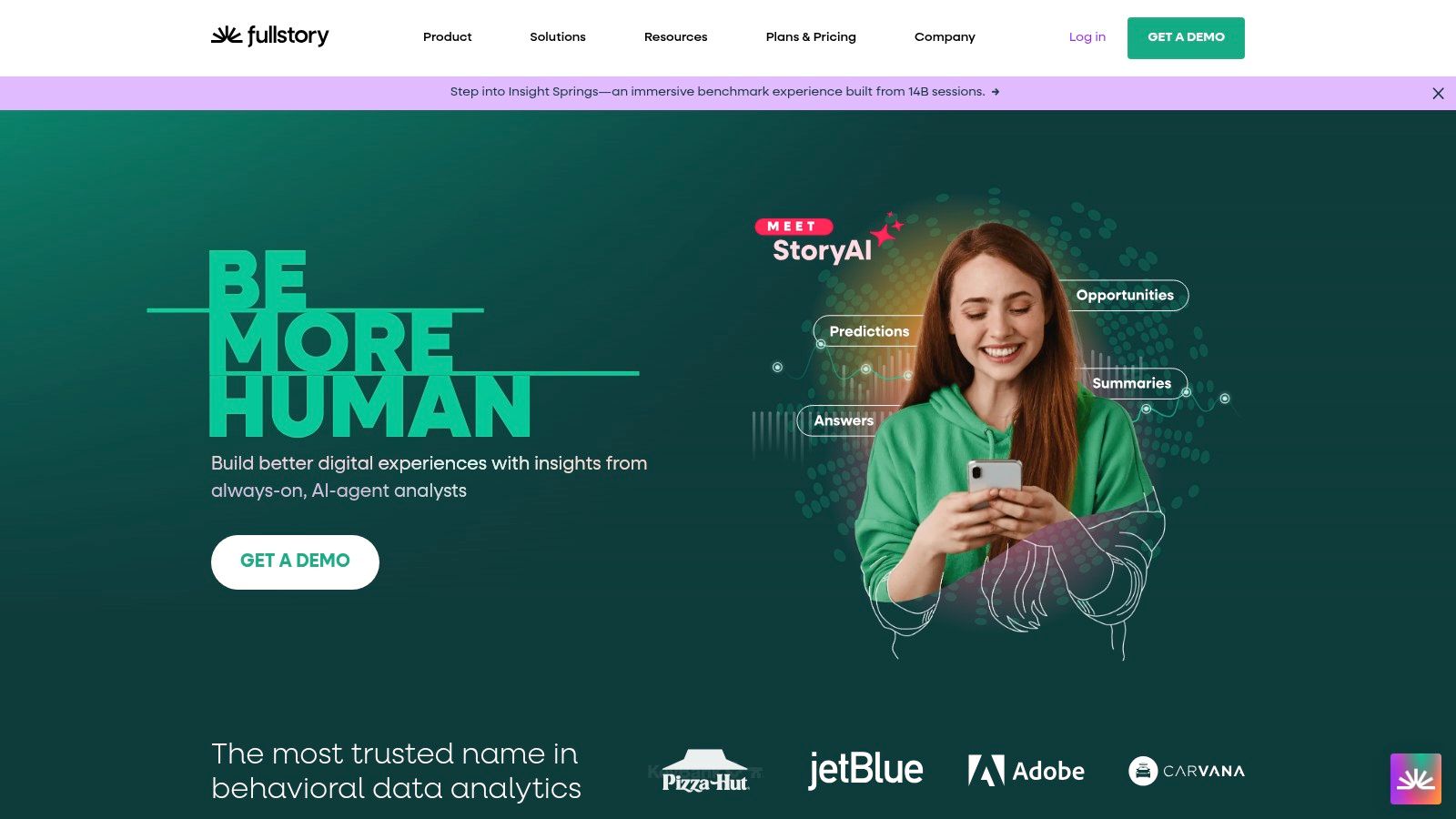
The platform goes beyond simple replay by layering quantitative data like funnels, trends, and heatmaps directly on top of qualitative insights. Its advanced filtering and segmentation allow product, engineering, and support teams to quickly find relevant sessions related to specific bugs, rage clicks, or user segments. With enterprise-grade privacy controls and an AI assistant, FullStory empowers organizations to proactively improve their digital experience at scale.
Key Features & Considerations
- Autocapture & Replay: Captures all user events automatically for flawless session playback and retroactive analysis.
- Digital Experience Intelligence: Combines qualitative replays with quantitative data like funnels, heatmaps, and friction signals.
- Enterprise-Ready: Offers robust privacy controls, governance, and mobile SDKs for comprehensive cross-platform analysis.
ProsConsIndustry-leading session replay quality and friction detection.Most pricing plans are sales-led and can be premium for large-scale use.A free plan is available to get started and test the platform.The depth of features may require dedicated onboarding or services to maximize value.Excellent for cross-functional collaboration (product, engineering, support).Autocapture can collect a vast amount of data, requiring careful management.
Website: https://www.fullstory.com
5. PostHog
PostHog is a powerful, open-core product analytics suite designed with developers in mind. It offers a comprehensive, all-in-one platform that includes product analytics, session replay, feature flags, A/B testing, and even surveys, consolidating tools that are often purchased separately. As one of the most flexible user behavior analytics tools, its key differentiator is its deployment model: you can use their cloud version or self-host the entire platform for maximum data control and privacy.
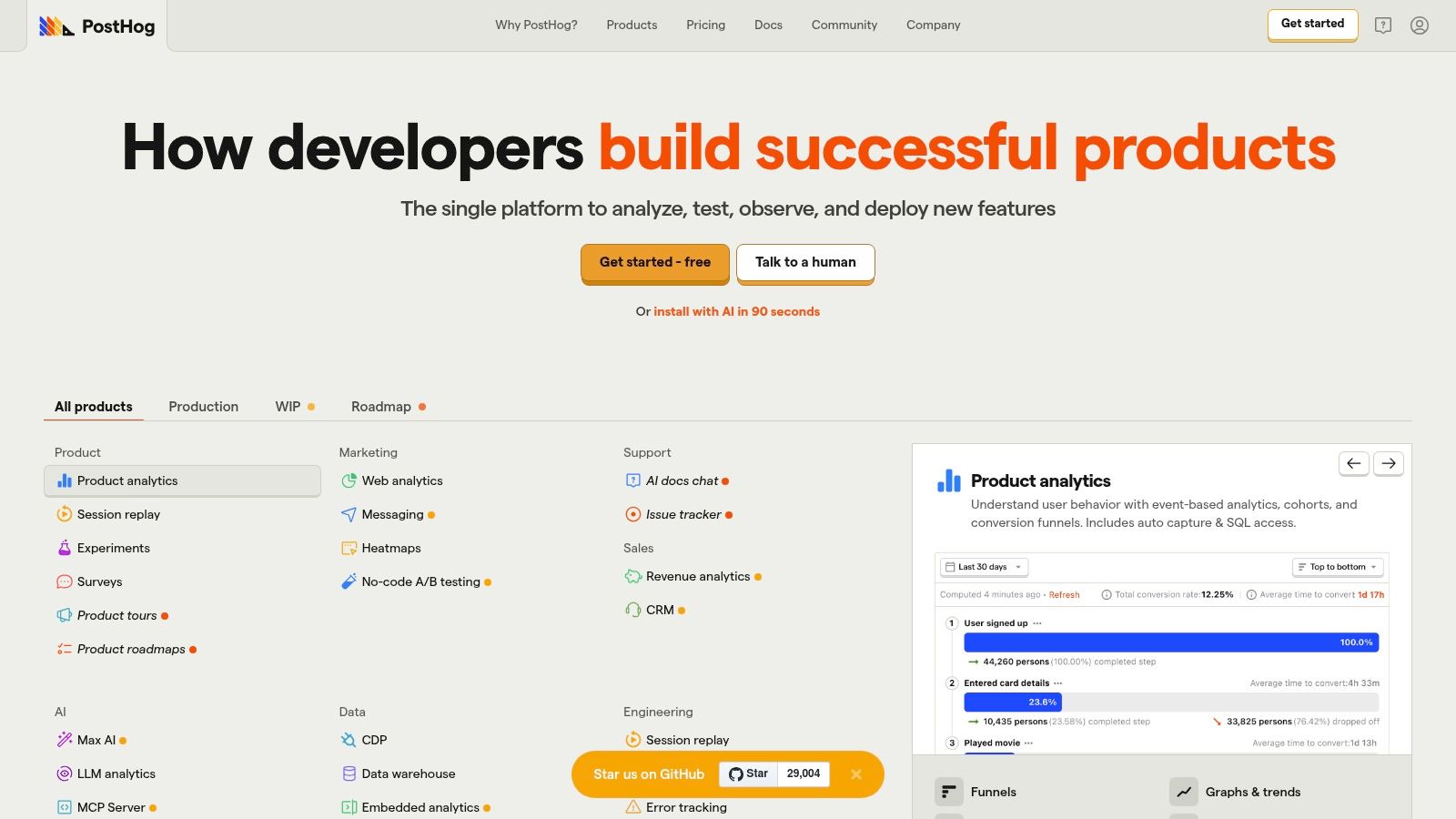
This approach makes PostHog particularly appealing for engineering-led teams and organizations prioritizing data ownership. Its integrated toolset enables a seamless workflow from analyzing user behavior to deploying a new feature flag or experiment based on those insights. This tight integration is a core component for companies practicing a product-led growth strategy. The platform's usage-based pricing and generous free tiers for each product remove significant barriers to entry for startups.
Key Features & Considerations
- All-in-One Platform: Combines analytics, session replay, feature flags, A/B testing, and surveys into a single product.
- Deployment Flexibility: Offers both a managed cloud service and a self-hostable open-source version for complete data control.
- Developer-Centric: Built with a strong focus on engineering workflows, transparency, and an open-source ethos.
ProsConsFree tier is generous across all products (>1M events/month).The comprehensive product menu can become costly at high volumes.Self-hosting option provides ultimate data privacy and control.DIY implementation for self-hosting may require dedicated engineering time.No long-term contracts and the ability to set billing caps.Can be more complex to manage than single-purpose analytics tools.
Website: https://posthog.com
6. Pendo
Pendo is a comprehensive product experience platform that uniquely combines quantitative analytics with qualitative feedback and in-app user guidance. It’s designed not just to help teams understand what users are doing, but to actively influence that behavior to improve adoption, retention, and customer satisfaction. While many platforms focus solely on analysis, Pendo stands out by integrating powerful tools for onboarding, surveys, and feature announcements directly within your application.
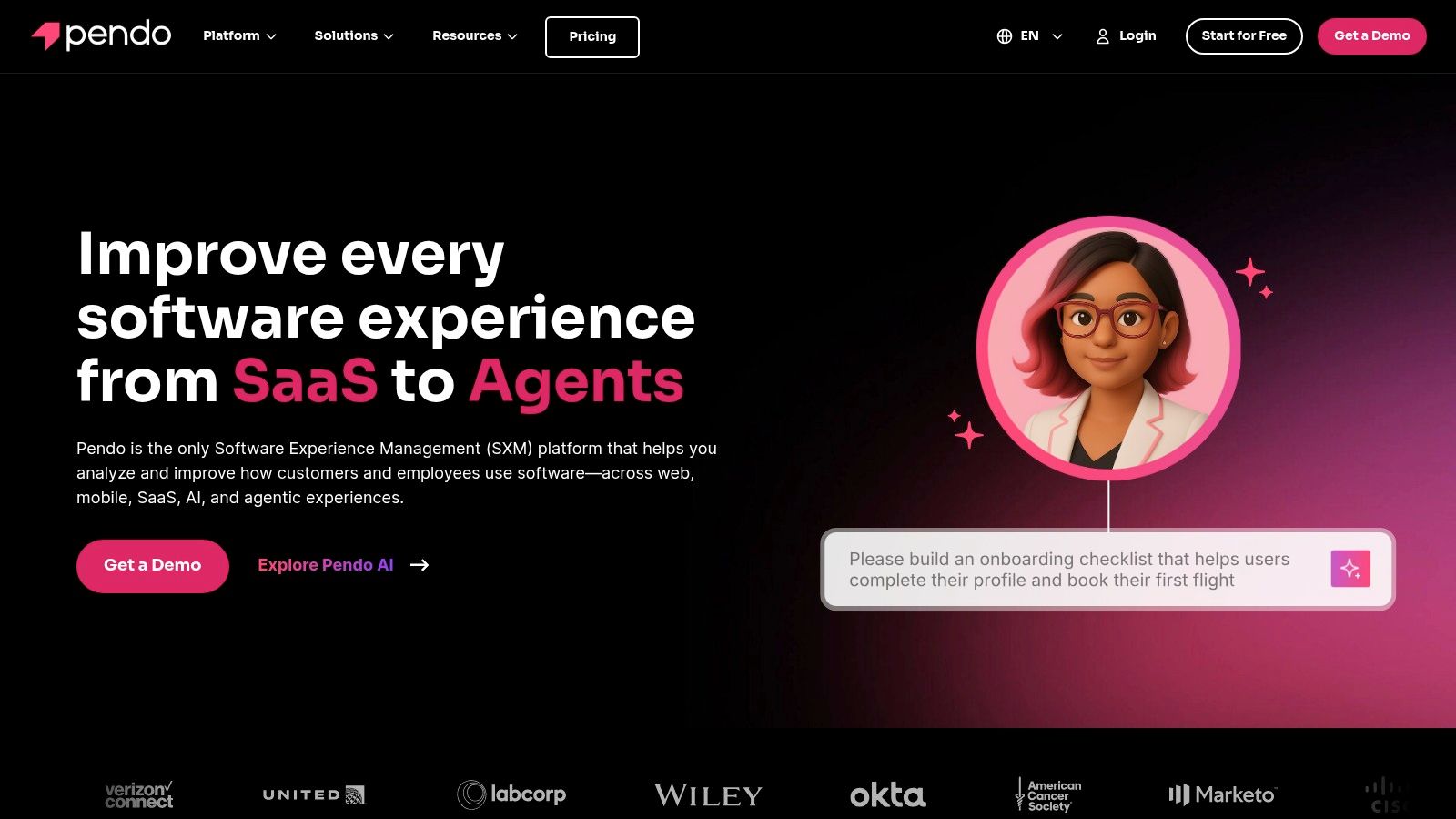
This "measure and act" approach makes Pendo one of the most effective user behavior analytics tools for product managers and customer success teams who need to close the loop between insight and action. You can identify where users struggle via analytics and immediately deploy an in-app guide to help them, all without writing new code. Its ability to collect feedback, manage roadmaps, and orchestrate user journeys makes it a powerful, centralized solution for larger organizations focused on product-led growth.
Key Features & Considerations
- Integrated In-App Guidance: Combine analytics with the ability to deploy guides, tooltips, and surveys to influence user behavior.
- Feedback & Roadmapping: Collect user feedback and connect it directly to feature planning and prioritization within the platform.
- Enterprise-Ready: Built to scale with features for governance and robust support, making it suitable for large, complex organizations.
ProsConsStrong integrated platform for both analyzing and influencing behavior.Pricing is not public and is generally positioned at a higher price point.Excellent for creating user onboarding flows and driving feature adoption.Often requires multi-year commitments and may have significant price escalations upon renewal.Scales effectively with robust governance for large enterprise teams.The pure analytics capabilities may not be as deep as specialized competitors like Amplitude.
Website: https://www.pendo.io
7. Contentsquare
Contentsquare is an enterprise-grade digital experience analytics platform designed for large-scale businesses needing a granular view of online customer behavior. It moves beyond traditional analytics by offering a suite of tools focused on visualizing and quantifying every aspect of the user journey. As one of the more advanced user behavior analytics tools, it excels at turning complex interaction data into actionable insights through its AI-driven engine and unique visualization features.
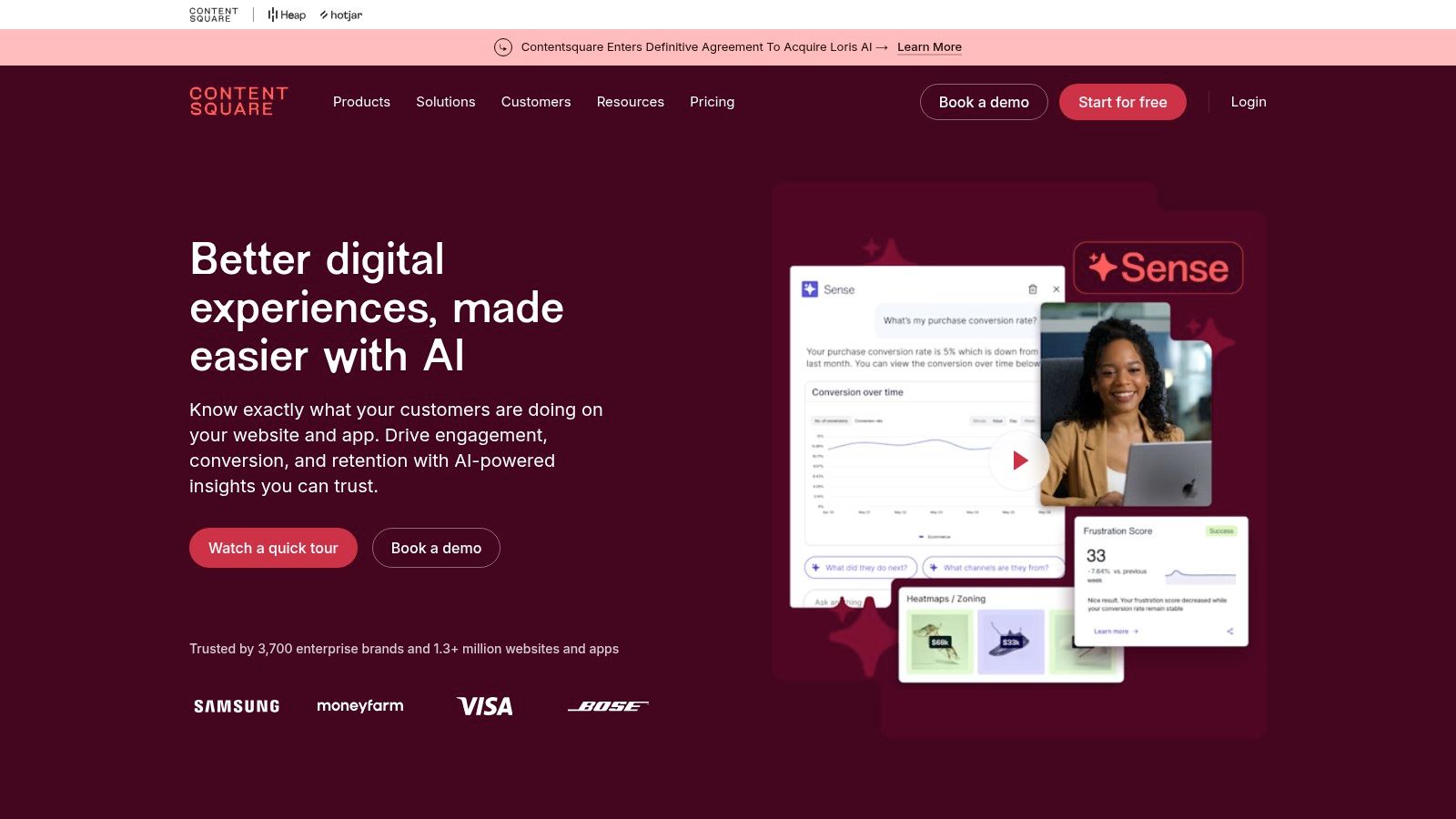
The platform is particularly known for its zone-based heatmaps, which provide aggregated behavioral metrics for every element on a page without requiring manual tagging. Combined with session replay, AI-powered insights, and detailed journey analysis, Contentsquare helps teams understand not just what users are doing, but why. Its acquisition of Hotjar also positions it as a comprehensive solution, providing a clear migration path for growing teams that need more robust enterprise capabilities for their customer journey optimisation.
Key Features & Considerations
- Zone-Based Heatmaps: Automatically analyzes every element on a page to show engagement metrics like click rate, hesitation time, and scroll reach.
- AI-Driven Insights: Proactively surfaces user friction points, technical errors, and opportunities for conversion improvement.
- Impact Quantification: Helps teams prioritize fixes and optimizations by estimating the potential revenue impact of specific UX issues.
ProsConsDeep enterprise features for complex customer journeys.Pricing is sales-led and generally enterprise-level.Strong analytics depth across web and mobile.May be too complex or overkill for smaller teams.Defined migration path for Hotjar customers.Can have a significant learning curve to master all features.
Website: https://contentsquare.com
8. Glassbox
Glassbox is a digital experience intelligence platform designed for enterprises, particularly those in regulated industries like finance, healthcare, and insurance. It provides a highly detailed, pixel-perfect view of every user session, combining session replay with journey mapping and performance analytics. Where many platforms focus solely on product or marketing insights, Glassbox extends its capabilities to include fraud detection, compliance, and even call center integration, making it one of the most versatile user behavior analytics tools for complex organizations.
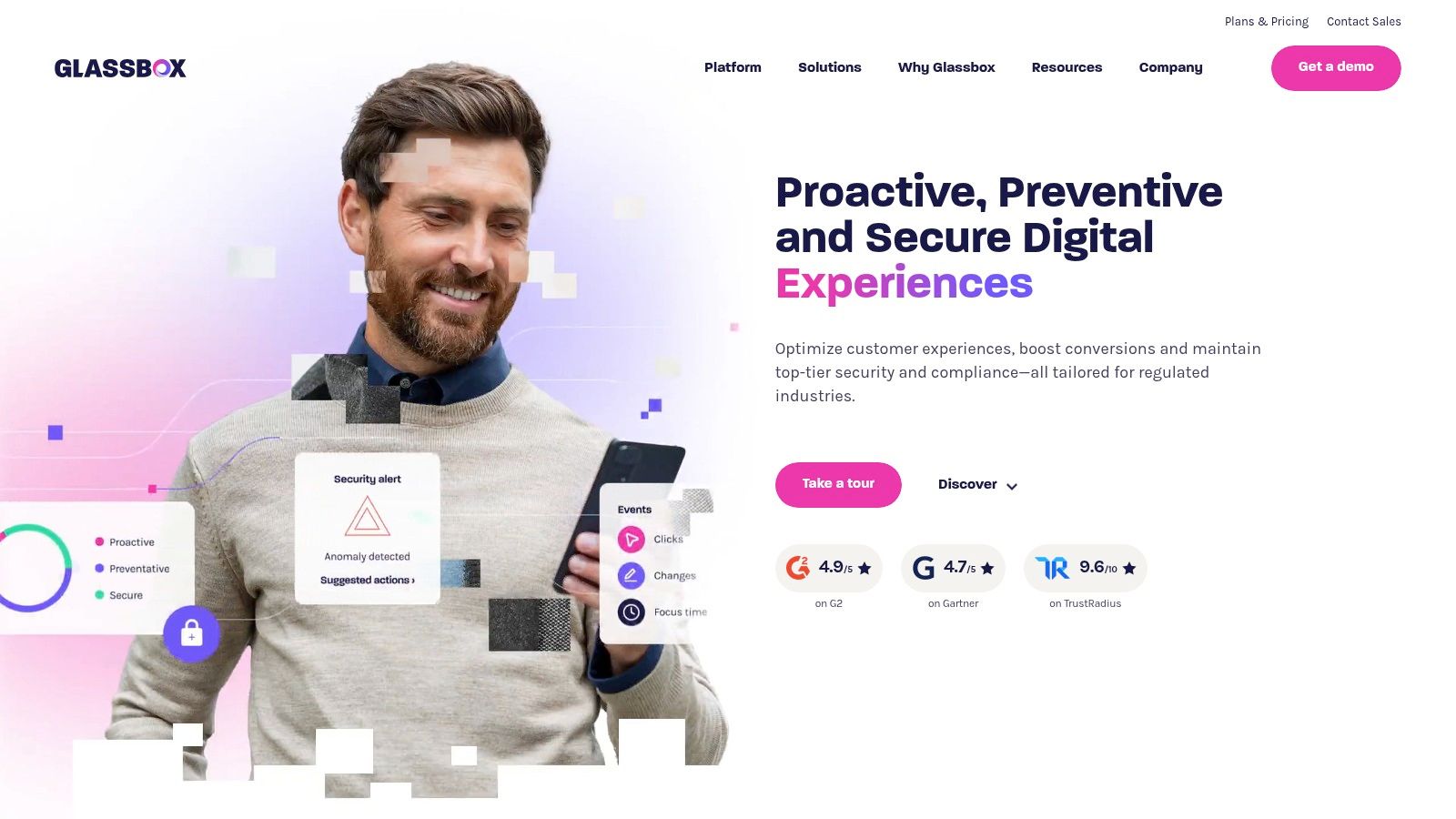
This platform excels at providing a single source of truth for digital interactions, capturing 100% of session data without sampling. Its flexible deployment options, including on-premises and hybrid cloud, cater to strict data residency and security requirements. For teams needing to diagnose technical issues, optimize conversions, and ensure regulatory adherence simultaneously, Glassbox offers a unified solution that connects digital experience to broader business operations.
Key Features & Considerations
- Comprehensive Session Replay: Captures every interaction with high fidelity for complete visibility.
- Journey & Funnel Analysis: Maps user paths and identifies drop-off points in critical conversion flows.
- Enterprise-Grade Compliance: Offers flexible deployment options (cloud, hybrid, on-premises) to meet security and data governance needs.
- Industry-Specific Add-ons: Provides specialized modules for fraud detection, accessibility compliance, and more.
ProsConsFlexible deployment and strong compliance posture.Pricing is custom and not publicly transparent.Excellent fit for regulated industries needing full data capture.The platform's depth can present a learning curve for new users.Modular packaging allows for role and use-case specific solutions.May be overly complex for smaller teams with basic analytics needs.
Website: https://www.glassbox.com
9. Microsoft Clarity
Microsoft Clarity is a completely free analytics tool that offers a powerful entry point into understanding user behavior through visual data. It stands out by providing core features like heatmaps and session recordings without any cost or traffic limits, making it an unbeatable choice for startups, bloggers, and small businesses. Unlike more complex platforms, Clarity focuses on delivering qualitative insights, helping you see exactly where users click, how far they scroll, and what moments of frustration they encounter on your website.
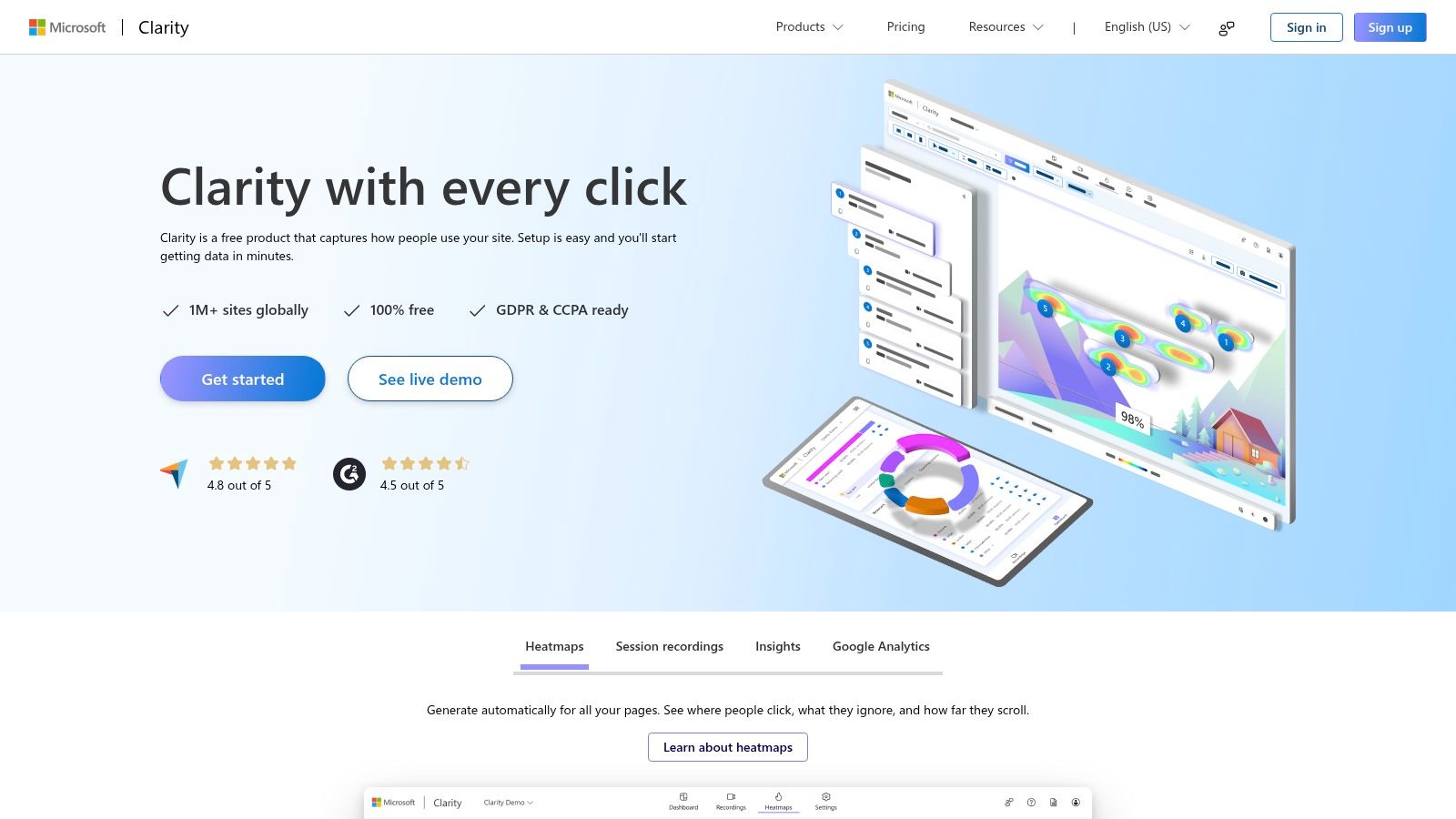
The platform is exceptionally easy to set up, often requiring just a single snippet of code. Its deep integration with Google Analytics allows you to connect qualitative session replays with your quantitative traffic data, providing a more complete picture of the user journey. While it doesn't offer the deep, event-based product analytics of its paid competitors, Clarity is one of the best user behavior analytics tools for teams needing to quickly identify UX issues and gain foundational behavioral insights without any budget.
Key Features & Considerations
- Unlimited Heatmaps & Recordings: Provides auto-generated click, scroll, and area heatmaps, plus unlimited session replays for all your pages.
- Frustration Signals: Automatically flags user sessions with "rage clicks," "dead clicks," and "excessive scrolling" to pinpoint UX problems.
- Google Analytics Integration: Seamlessly connects with Google Analytics to link recordings and heatmaps directly to your existing data.
ProsCons100% free with no traffic limits or sampling.Lacks advanced product analytics and custom event tracking.Extremely easy to set up and lightweight on site performance.Does not include A/B testing or feature flagging capabilities.Provides an excellent baseline for UX analysis and CRO.Less suitable for complex, data-driven product teams.
Website: https://clarity.microsoft.com
10. Google Analytics 4 (GA4)
Google Analytics 4 (GA4) is the latest evolution of the world's most ubiquitous web analytics service, shifting from a session-based model to a more flexible, event-based framework. This change makes it one of the most fundamental user behavior analytics tools for businesses of all sizes, designed to measure user journeys across websites and apps. It provides a unified view of the customer lifecycle, focusing on events and user properties rather than just page views.
GA4 excels at integrating with the broader Google ecosystem, including Google Ads and BigQuery, allowing for powerful ad attribution analysis and unsampled data exploration. While the free version is robust, the enterprise-grade GA4 360 tier offers higher data limits, service-level agreements (SLAs), and more advanced features. The platform's "Explorations" hub allows users to build custom reports, such as funnels and path explorations, to dig deeper into user behavior without requiring a data science background.
Key Features & Considerations
- Event-Based Data Model: Tracks granular user interactions across websites and apps for a complete journey view.
- Deep Google Ecosystem Integration: Seamlessly connects with Google Ads, BigQuery, and Search Console for comprehensive marketing analysis.
- Advanced Reporting Hub: The "Explorations" feature provides powerful, template-driven tools for custom analysis and data visualization.
ProsConsFree version is powerful and widely adopted.Steep learning curve and complex UI compared to its predecessor, Universal Analytics.Ubiquitous platform with vast free training resources.Data sampling and a 14-month user data retention limit on the free tier.Strong integration with BigQuery for advanced analysis.GA4 360 is expensive and targeted at large enterprises.
Website: https://marketingplatform.google.com/analytics
11. AWS Marketplace
AWS Marketplace is not a standalone tool but a centralized procurement platform that significantly simplifies how enterprise teams discover, purchase, and deploy software. For organizations already invested in the AWS ecosystem, it offers a streamlined way to acquire leading user behavior analytics tools by consolidating billing and standardizing contract terms. This approach removes much of the friction associated with traditional vendor onboarding, allowing teams to get started with new analytics solutions more quickly.
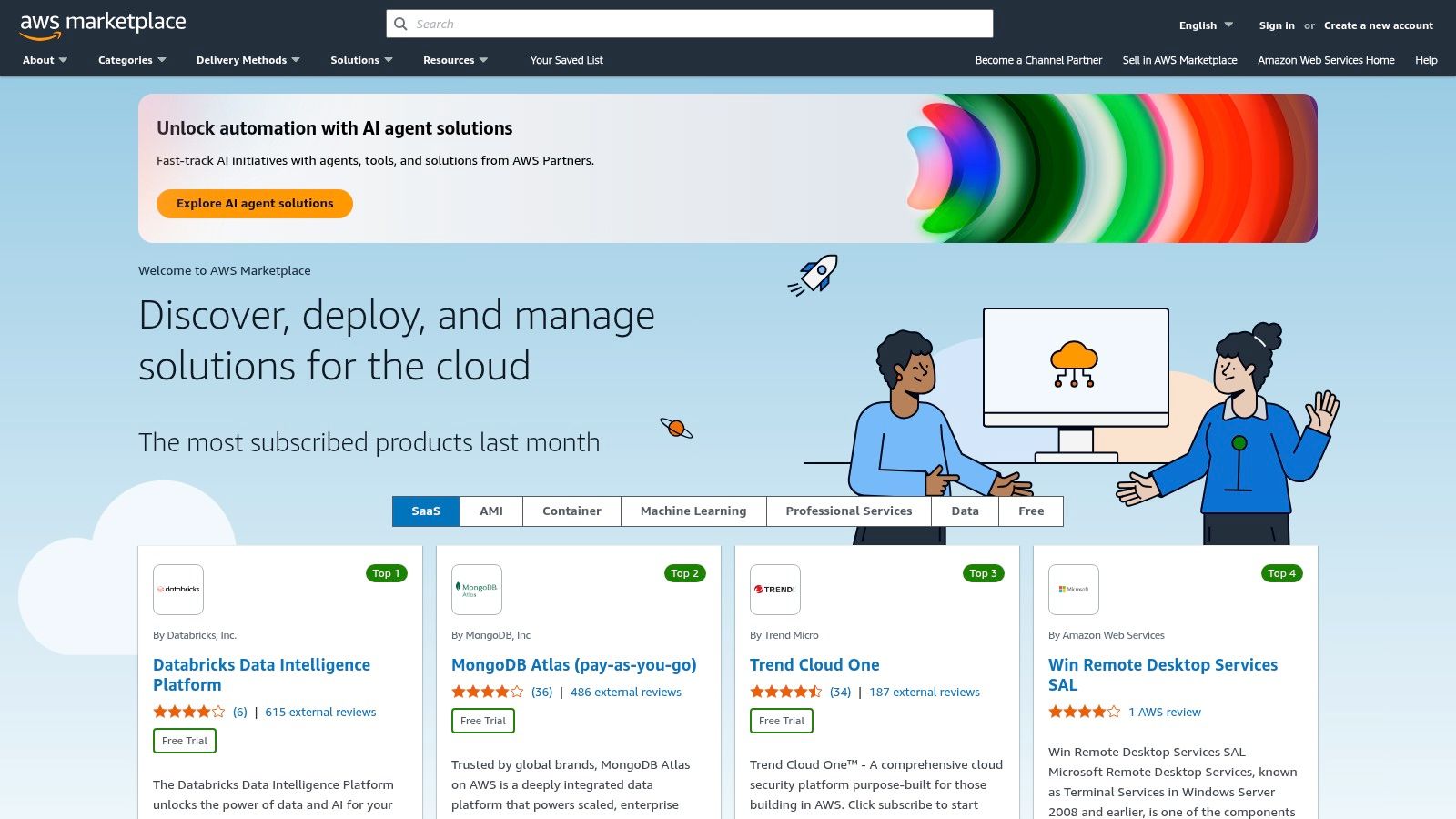
The platform is particularly valuable for its focus on compliance and security. AWS Vendor Insights provides access to security and compliance reports, helping technical and legal teams vet potential vendors efficiently. Buyers can also leverage private offers and request-a-quote workflows to negotiate custom pricing and terms directly with analytics providers. This makes the marketplace an essential resource for enterprises looking to manage software procurement securely and at scale.
Key Features & Considerations
- Centralized Procurement: Discover, buy, and deploy third-party software, including analytics tools, with consolidated AWS billing.
- Vendor Insights: Streamlines the risk assessment process with access to vendors' security and compliance information.
- Flexible Contracting: Supports private offers and customized pricing, allowing for tailored agreements that meet enterprise needs.
ProsConsStreamlines procurement for teams on AWS.Pricing for many tools requires direct vendor contact via a quote request.Supports security and compliance transparency.Not all vendors list every plan or product version available on their main site.Consolidated AWS billing and standardized contract terms.The discovery process can be less intuitive than a dedicated review site.
Website: https://aws.amazon.com/marketplace
12. G2
While not a direct analytics platform itself, G2 serves as an indispensable resource for anyone researching user behavior analytics tools. It's a leading B2B software marketplace where you can find, compare, and read verified user reviews for hundreds of solutions in the product analytics space. By aggregating user feedback, feature lists, and pricing information, G2 provides a comprehensive, unbiased overview of the market, helping teams shortlist vendors that best fit their specific needs and budget.
The platform's strength lies in its comparison grids and detailed review filters, which allow you to see how different tools stack up against each other based on real-world user satisfaction. You can filter by company size, industry, or specific features to narrow down the options. This makes it an essential first stop for product managers and marketers looking to make an informed purchasing decision without relying solely on vendor marketing materials. It streamlines the discovery phase of finding the right analytics partner.
Key Features & Considerations
- Verified User Reviews: Access authentic feedback from real users, offering insights into usability, support, and implementation.
- Side-by-Side Comparisons: Use grid reports to directly compare features, pricing, and satisfaction ratings of competing tools.
- Category-Specific Research: Explore dedicated categories like Product Analytics to find leaders, contenders, and niche players.
ProsConsProvides a broad, current overview of the market and alternatives.Pricing information can sometimes lag behind official vendor updates.Aggregates useful pricing ballparks and detailed plan breakdowns.Sponsored placements and vendor-driven reviews can appear in listings.Direct links to official product pages, trials, and demos.The sheer volume of options can feel overwhelming without clear criteria.
Website: https://www.g2.com/categories/product-analytics
Comparison of the Best User Behavior Analytics Tools
ProductCore Features & CapabilitiesUser Experience & Quality ★★★★☆Value & Pricing 💰Target Audience 👥Unique Selling Points ✨AmplitudeBehavioral cohorts, funnels, session replay, A/B testingStrong behavioral depth, scalableGenerous free tier, usage-basedSMBs to enterpriseComprehensive analytics + experimentation 🏆MixpanelReal-time event analytics, guided AI insightsFast insights, mature PLG reportingFree plan, event-based pricingStartups to scaleReal-time speed, clear billingHeapAutocapture, retroactive event creationQuick time-to-valueFree tier, pricing opaqueB2B, validation stage startupsAutocapture with account-level analyticsFullStorySession replay, heatmaps, AI assistantsExcellent replay quality, enterpriseFree plan available, sales-led pricingEnterprise-grade usersHigh-fidelity replay + privacy controlsPostHogProduct analytics, feature flags, self-host optionDeveloper-friendly, open sourceGenerous free tier, usage-basedStartups, dev teamsSelf-hosting + open-core flexibilityPendoBehavior analytics, in-app guides, journey orchestrationIntegrated measure + act platformMAU-based, typically higher pricedLarge organizationsIn-app guidance + adoption playbooksContentsquareJourney analysis, zone heatmaps, AI insightsDeep enterprise analyticsSales-led, enterprise-levelEnterprise usersAI-driven insights + Hotjar migrationGlassboxSession replay, journey analytics, regulated industriesFlexible deployment, compliance focusCustom pricing, complex platformRegulated industriesFraud detection + hybrid/on-prem deploymentMicrosoft ClarityUnlimited replays, heatmaps, Google Analytics integrationLightweight, fast setup100% freeBasic analytics usersForever free with unlimited sessionsGoogle Analytics 4Event tracking, BigQuery export, ad integrationsWidely adopted, complex UIFree GA4, expensive GA4 360General web/app analyticsDeep ecosystem & enterprise SLAs
Choosing the Right User Behavior Analytics Tool
Navigating the landscape of user behavior analytics tools can feel overwhelming, but the journey from raw data to actionable insight is a transformative one for any digital business. The key takeaway is that no single tool is universally superior; the "best" platform is the one that aligns with your specific objectives, budget, and team resources.
From the deep, event-based product analytics of Amplitude and Mixpanel to the codeless, retroactive data capture offered by Heap, the options are vast. For those focused on qualitative insights, session replay tools like FullStory and Microsoft Clarity provide an unparalleled "over-the-shoulder" view of the user experience. Meanwhile, open-source solutions like PostHog offer flexibility and control for engineering-centric teams.
A Practical Framework for Your Selection
Before committing to a platform, it is crucial to move beyond feature lists and assess your organization's readiness and strategic focus. Answering these questions will guide you to the most effective solution:
- What is your primary goal? Are you trying to improve conversion funnels (Mixpanel, GA4), reduce user friction (FullStory, Glassbox), or understand feature adoption (Pendo, Amplitude)? Define your core business question first.
- What are your technical resources? Do you have dedicated developers to implement and manage complex tracking plans, or do you need a low-code or no-code solution like Heap or Microsoft Clarity that your marketing and product teams can manage independently?
- How will you bridge insight to action? Data is only valuable when it drives improvement. Your chosen tool should not just tell you what is happening but also empower you to act. Consider how you will connect analytics findings to your product roadmap, A/B testing efforts, and user support initiatives.
- What is your budget and expected ROI? While free tools offer a great starting point, enterprise platforms provide advanced security, support, and segmentation. Evaluate the total cost of ownership, including implementation and training, against the potential revenue lift from improved retention and conversion.
Ultimately, the goal of implementing any of these user behavior analytics tools is to build a more intuitive, valuable, and user-centric product. The data you collect is a direct line to your users' needs, frustrations, and successes. By selecting a tool that fits your workflow and empowers your team to act decisively, you can transform user behavior insights into a powerful engine for sustainable growth.
Ready to turn your analytics insights into immediate action? While the tools in this list excel at showing you where users struggle, Worknet.ai Inc helps you engage them at that exact moment. By deploying AI-powered, context-aware chat, you can proactively guide users, answer questions, and prevent churn before it happens. Learn how to complete the analytics loop at Worknet.ai Inc.
FAQs
.png)
Lorem ipsum dolor sit amet, consectetur adipiscing elit. Suspendisse varius enim in eros elementum tristique. Duis cursus, mi quis viverra ornare, eros dolor interdum nulla, ut commodo diam libero vitae erat. Aenean faucibus nibh et justo cursus id rutrum lorem imperdiet. Nunc ut sem vitae risus tristique posuere.
Lorem ipsum dolor sit amet, consectetur adipiscing elit. Suspendisse varius enim in eros elementum tristique. Duis cursus, mi quis viverra ornare, eros dolor interdum nulla, ut commodo diam libero vitae erat. Aenean faucibus nibh et justo cursus id rutrum lorem imperdiet. Nunc ut sem vitae risus tristique posuere.
Lorem ipsum dolor sit amet, consectetur adipiscing elit. Suspendisse varius enim in eros elementum tristique. Duis cursus, mi quis viverra ornare, eros dolor interdum nulla, ut commodo diam libero vitae erat. Aenean faucibus nibh et justo cursus id rutrum lorem imperdiet. Nunc ut sem vitae risus tristique posuere.
Lorem ipsum dolor sit amet, consectetur adipiscing elit. Suspendisse varius enim in eros elementum tristique. Duis cursus, mi quis viverra ornare, eros dolor interdum nulla, ut commodo diam libero vitae erat. Aenean faucibus nibh et justo cursus id rutrum lorem imperdiet. Nunc ut sem vitae risus tristique posuere.
Lorem ipsum dolor sit amet, consectetur adipiscing elit. Suspendisse varius enim in eros elementum tristique. Duis cursus, mi quis viverra ornare, eros dolor interdum nulla, ut commodo diam libero vitae erat. Aenean faucibus nibh et justo cursus id rutrum lorem imperdiet. Nunc ut sem vitae risus tristique posuere.
Lorem ipsum dolor sit amet, consectetur adipiscing elit. Suspendisse varius enim in eros elementum tristique. Duis cursus, mi quis viverra ornare, eros dolor interdum nulla, ut commodo diam libero vitae erat. Aenean faucibus nibh et justo cursus id rutrum lorem imperdiet. Nunc ut sem vitae risus tristique posuere.
Lorem ipsum dolor sit amet, consectetur adipiscing elit. Suspendisse varius enim in eros elementum tristique. Duis cursus, mi quis viverra ornare, eros dolor interdum nulla, ut commodo diam libero vitae erat. Aenean faucibus nibh et justo cursus id rutrum lorem imperdiet. Nunc ut sem vitae risus tristique posuere.
Lorem ipsum dolor sit amet, consectetur adipiscing elit. Suspendisse varius enim in eros elementum tristique. Duis cursus, mi quis viverra ornare, eros dolor interdum nulla, ut commodo diam libero vitae erat. Aenean faucibus nibh et justo cursus id rutrum lorem imperdiet. Nunc ut sem vitae risus tristique posuere.
Lorem ipsum dolor sit amet, consectetur adipiscing elit. Suspendisse varius enim in eros elementum tristique. Duis cursus, mi quis viverra ornare, eros dolor interdum nulla, ut commodo diam libero vitae erat. Aenean faucibus nibh et justo cursus id rutrum lorem imperdiet. Nunc ut sem vitae risus tristique posuere.
Lorem ipsum dolor sit amet, consectetur adipiscing elit. Suspendisse varius enim in eros elementum tristique. Duis cursus, mi quis viverra ornare, eros dolor interdum nulla, ut commodo diam libero vitae erat. Aenean faucibus nibh et justo cursus id rutrum lorem imperdiet. Nunc ut sem vitae risus tristique posuere.

.svg)


.webp)
.webp)
.webp)




